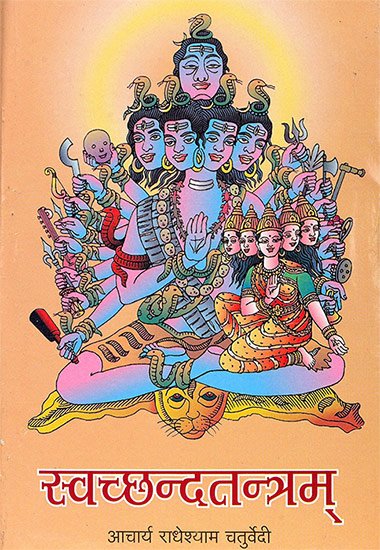Svacchanda-tantra [sanskrit]
30,869 words | ISBN-10: 8172700989 | ISBN-13: 9788172700980
The Sanskrit edition of the Svacchanda-tantra, a large work in the form of a manaul describing Kashmir Shaiva rituals. The extant Svacchandatantra contains over 3,000 shlokas (metrical verses) and highlights the worship of Svacchanda Bhairava (a fierce form of Shiva) and his consort Aghoreshvari. The text can be dated to at least the 7th century. Alternative titles: Svacchandatantra (स्वच्छन्दतन्त्र), Śrīsvacchandatantram (श्रीस्वच्छन्दतन्त्रम्, Shrisvacchandatantram)
Verse 11.37
कारणानां पुनर्व्याप्तिं कथयामि समासतः ।
तत्त्वे तु पार्थिवे ब्रह्मा अधिष्ठाता व्यवस्थितः ॥ ३७ ॥
kāraṇānāṃ punarvyāptiṃ kathayāmi samāsataḥ |
tattve tu pārthive brahmā adhiṣṭhātā vyavasthitaḥ || 37 ||
The Sanskrit text of Svacchanda-tantra Verse 11.37 is contained in the book Sri Svacchandatantram (Set of 5 Volumes) by Dr. Paramahansa Mishra (डॉ. परमहंस मिश्र). This book is not available online so in order to read the full text and translation you should buy the book:
Buy now! Sanskrit text by Dr. Paramahansa Mishra (डॉ. परमहंस मिश्र) (2004)
Glossary of Sanskrit terms
Note: This extracts Sanskrit terms and links to English definitions from the glossary, based on an experimental segmentation of verse (11.37). Some terms could be superfluous while some might not be mentioned. Click on the word to show English definitions.
Karana, Punar, Vyapti, Samasatah, Tattva, Parthiva, Parthivi, Brahma, Adhishthatri, Vyavasthita,
Analysis of Sanskrit grammar
Note: this is an experimental feature and only shows the first possible analysis of the Sanskrit text (Svacchanda-tantra Verse 11.37). If the system was successful in segmenting the sentence, you will see of which words it is made up of, generally consisting of Nouns, Pronouns, Verbs, Participles and Indeclinables. Click on the link to show all possible derivations of the word.
- Line 1: “kāraṇānāṃ punarvyāptiṃ kathayāmi samāsataḥ ”
- kāraṇānām -
-
kāraṇa (noun, neuter)[genitive plural]kāraṇā (noun, feminine)[genitive plural]
- punar -
-
punar (indeclinable adverb)[indeclinable adverb]punar (indeclinable)[indeclinable]
- vyāptim -
-
vyāpti (noun, feminine)[accusative single]
- kathayāmi -
-
√kath (verb class 10)[present active first single]
- samāsataḥ -
-
samāsataḥ (indeclinable)[indeclinable]
- Line 2: “tattve tu pārthive brahmā adhiṣṭhātā vyavasthitaḥ ”
- tattve -
-
tattva (noun, neuter)[nominative dual], [vocative dual], [accusative dual], [locative single]
- tu -
-
tu (indeclinable particle)[indeclinable particle]
- pārthive -
-
pārthiva (noun, masculine)[locative single]pārthiva (noun, neuter)[nominative dual], [vocative dual], [accusative dual], [locative single]pārthivi (noun, masculine)[vocative single]pārthivi (noun, feminine)[vocative single]
- brahmā* -
-
brahma (noun, masculine)[nominative plural], [vocative plural]brahmā (noun, feminine)[nominative plural], [vocative plural], [accusative plural]
- adhiṣṭhātā -
-
adhiṣṭhātṛ (noun, masculine)[nominative single]
- vyavasthitaḥ -
-
vyavasthita (noun, masculine)[nominative single]
Other editions:
Also see the following editions of the Sanskrit text or (alternative) English translations of the Svacchanda-tantra Verse 11.37
Svacchandatantram (Two Volumes)
by Prof.Radheyshyam Chaturvedi (2004)
With the Commentary Svacchandodyota by Acarya Sri Ksemaraja and Jnanavati; [Sanskrit Text With Hindi Translation]; [स्व्छ्न्द्तन्त्रम]; [Chaukhambha Vidya Bhawan]
Buy now!![Svacchanda-tantra [sanskrit] - book cover](/uploads/a/Svacchanda-Tantra-Sanskrit.jpg)
